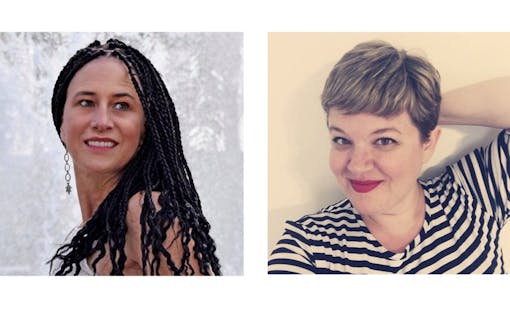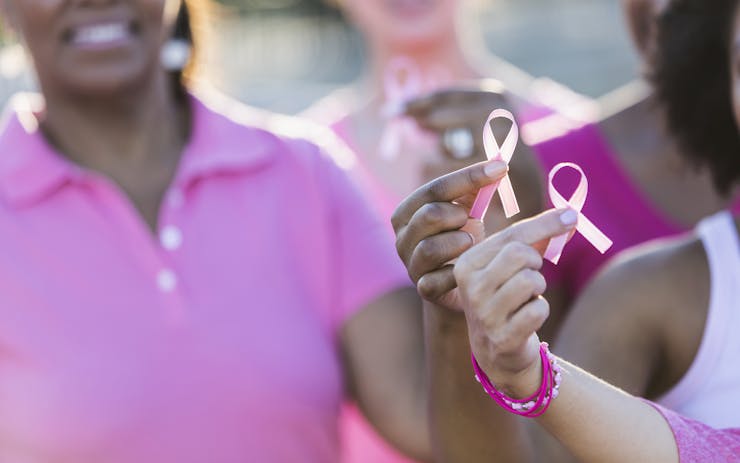Breast cancer, according to the CDC, is the “most common cancer in women, no matter your race or ethnicity.” This disease is a concern for all genders, as the CDC highlights from its most recent available statistics (2013) that “230,815 women and 2,109 men in the United States were diagnosed with breast cancer.”
Two of my friends are currently at different stages of their breast cancer journey. Kristy Edwards was just diagnosed in early 2017 and is in currently the midst of her first round of chemotherapy. Nique Pichette, RN, MSN, has battled breast cancer twice and is now adjusting to life after cancer. I asked them to share their experiences about how cannabis has impacted their quality of life, both during and after treatment. If more patients are willing to be “out” about their experiences, we can build and present a greater body of knowledge to elected officials who can keep these stories of real people (and, specifically, real voters) in mind when shaping policies in the future.

Left to right: Nique Pichette and Kristy Edwards
How did you find out you had breast cancer?
Kristy Edwards: I was laying in bed reading naked (as everyone should!), and I was mindlessly caressing my breast when I felt a lump. I didn’t get too concerned because I am 38 years old. Months later, I went in and had it biopsied, [and it was] stage 2 breast cancer—invasive ductal carcinoma. I was so close to not needing chemo and radiation, but unfortunately I do.
How has cannabis impacted your life since beginning treatment?
Nique Pichette: I did not use cannabis until my second battle with breast cancer in 2013. I had reached survivor status on November 14, 2011, 18 months before. I saw a picture of my son and I and I looked emaciated. As a nurse, and a Director of Nursing Operations at the time, I was petrified of losing my license. But I had lost my children to my eating disorder Anorexia Nervosa in 2005. I was not going down that path again. So I contacted my biggest advocate, Steven Placek, and my journey with cannabis as medicine began.
During treatment I was able to sleep at night. My appetite improved and the GI effects of chemotherapy that felt like cement running through my intestines were improved. After treatment, I started to learn as much as I could, both as a patient and a nurse, about cannabis as medicine. I had to learn the effectiveness for the symptoms I was trying to manage. [To get better educated], I’ve worked in a dispensary [and] have taught at the Northeastern Institute of Cannabis in Natick, MA. I received my cannabis nurse competency in 2015, and I developed the Cannabis Nurse Navigator Position to help patients navigate their way through the medical system while using medical marijuana.
Edwards: My experience with cannabis since starting chemo has been incredibly positive. I use a combination of ingestion methods: edibles, dabbing, transdermal patches, and vape pens. I prefer hybrid strains, and I find that [cannabis] helped ease my bone pain and keep my appetite going. It also helped me go to sleep when I was feeling that bone pain.
Another side effect was mental—cannabis helped me with the anxiety I felt about the diagnosis, and it helped me compartmentalize what I was going through without all of the emotion attached. I found that edibles were most helpful when I was in “the suck” of the first week. I took about 40mg of edibles to blast myself into oblivion. My favorite is a brand called Infused Creations. I supplement as needed with my Jetty Extracts vape pen—I use it every night to help me calm my thoughts and sleep. I’ve also been using a 1:1 transdermal patch from Nature Nurse because I’ve heard that CBD helps with stopping cancer growth, plus the patch helps with overall body pain.
I have fully embraced medicating myself through this ordeal, especially on a mental level. Cannabis helps me feel normal. My friends and family are all supportive of cannabis use as well, and it’s actually changing some of their minds about it. I feel like I’m becoming a huge advocate for the awesomeness of weed and am no longer afraid of talking about it. I can just say “I HAVE CANCER, DUH,” which seems to make people more compassionate.
Were your doctors supportive of you using cannabis?
Edwards: My doctor is supportive of my cannabis use. I told her I was going to be a heavy user and she said she was fine with it, because she knew it would help with appetite.
Pichette: My doctors at Dana Faber Cancer Institute in Boston, MA, would not write for my authorization, but they did not deny me my rights to obtaining my medical marijuana card in a legal state. I knew it was just a matter of time, and in 2016 I attended a conference at Harvard University in Boston, in which Dr. Raphael Mechoulam was awarded the Lifetime Achievement award for his half-century research on cannabis.
What advice or insights do you have for other newly diagnosed patients?
Edwards: For newly diagnosed patients, be open-minded about cannabis. It can truly help you in so many facets—both mentally and physically. Don’t be afraid of it. Experiment with your favorite strains; I personally love a body high.
Pichette: I would tell a newly diagnosed patient to embrace the journey. Getting angry [or] living in denial, worry, and fear will just add to the negative energy the cancer cells have from within. Remember that everyone’s journey is personal. It is not for family, friends, and medical professionals to judge a patient’s plan of care. Until you personally hear the words “You have cancer,” you cannot truly understand the answer to this question.
We want to hear more stories of how cannabis can help cope with the myriad effects of cancer. If you’d like to, please share your own story in the comments below.





